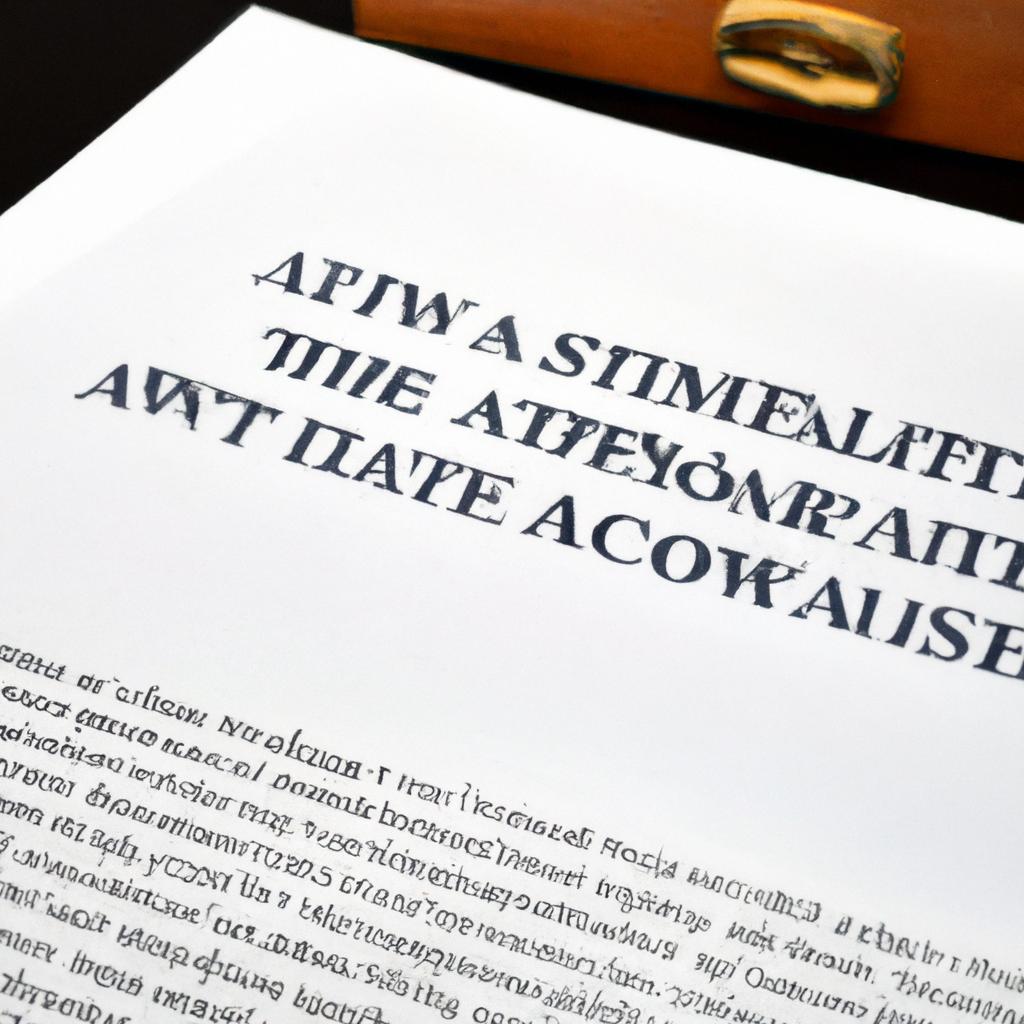In the intricate realm of estate planning, navigating the complexities of small estate affidavits can often prove to be a daunting task for individuals seeking to efficiently administer the assets of a deceased loved one. At Morgan Legal Group, based in the bustling metropolis of New York City, our team of seasoned attorneys specialize in guiding clients through the intricate process of executing small estate affidavits with precision and expertise. Join us as we delve into the intricacies of small estate affidavits and unravel the complexities surrounding this vital legal tool in the realm of estate administration.
Understanding the Small Estate Affidavit Process in New York
When a loved one passes away in New York, navigating the legal process of handling their estate can be a challenging and overwhelming task. Understanding the small estate affidavit process can help streamline the process and make it easier for you to settle the decedent’s affairs. A small estate affidavit“>small estate affidavit is a legal document that allows for the expedited transfer of assets to beneficiaries when the value of the estate falls below a certain threshold.
It is important to note that not all estates are eligible for the small estate affidavit process in New York. To qualify, the value of the estate must fall below $50,000, and there can be no real property involved. By filing a small estate affidavit, you can avoid the lengthy and costly probate process, saving time and money. Our experienced attorneys at Morgan Legal Group can help guide you through the small estate affidavit process and ensure that your loved one’s estate is handled efficiently and effectively.

Key Considerations When Filing a Small Estate Affidavit
When filing a small estate affidavit, there are several key considerations that must be taken into account to ensure the process goes smoothly and efficiently. One important factor to consider is whether the estate qualifies as a small estate under state law. Each state has its own criteria for what constitutes a small estate, typically based on the total value of the assets. It’s essential to confirm that the estate meets these requirements before proceeding with the affidavit.
- Asset Valuation: Properly valuing the assets included in the estate is crucial for determining whether it qualifies as a small estate. Be sure to accurately assess the value of all assets, including real estate, personal property, and financial accounts.
- Beneficiary Designation: It’s important to identify the beneficiaries who are entitled to receive assets from the estate. Make sure to include their full names and contact information in the affidavit to streamline the distribution process.

Navigating the Legal Requirements for a Small Estate Affidavit in New York
When it comes to , it’s important to understand the specific criteria that must be met in order to qualify for this simplified probate process. A Small Estate Affidavit can be a more cost-effective and efficient alternative to the traditional probate process for estates with limited assets. In New York, there are several key factors that must be considered when determining eligibility for a Small Estate Affidavit:
- The total value of the estate: In order to qualify for a Small Estate Affidavit in New York, the total value of the estate must be below a certain threshold, which is currently set at $50,000.
- Surviving heirs: Only certain individuals are eligible to file a Small Estate Affidavit in New York, including spouses, children, and parents of the deceased.
It’s important to note that while a Small Estate Affidavit can be a quicker and more efficient way to settle a small estate, it’s crucial to ensure that all legal requirements are met in order to avoid any potential complications or challenges down the road. Consulting with an experienced estate planning attorney can help ensure that you navigate the Small Estate Affidavit process smoothly and effectively, and ultimately secure the assets of the deceased for their rightful heirs.
| Assets | Value |
|---|---|
| Bank Account | $20,000 |
| Stocks | $15,000 |
| Real Estate | $45,000 |

Expert Recommendations for Successfully Completing a Small Estate Affidavit
When it comes to completing a small estate affidavit, there are several key recommendations that can help ensure a smooth and successful process. First and foremost, it is essential to gather all necessary documentation and information before beginning the affidavit. This includes details about the deceased individual’s assets, debts, and beneficiaries. Having this information on hand will make filling out the affidavit much easier and will help to avoid potential delays or complications.
Additionally, it is important to carefully review the requirements for a small estate affidavit in your state. Each state has specific rules and regulations regarding the affidavit process, so it is crucial to familiarize yourself with these guidelines before proceeding. Consulting with an experienced estate planning attorney can also be beneficial, as they can provide valuable insights and assistance throughout the process. Finally, be sure to submit the completed affidavit to the appropriate court or probate office in a timely manner to avoid any unnecessary delays.
Q&A
Q: What is a small estate affidavit?
A: A small estate affidavit is a legal document that can be used to transfer assets from a deceased person’s estate to their heirs without having to go through the probate process.
Q: When can a small estate affidavit be used?
A: A small estate affidavit can typically be used when the value of the deceased person’s estate falls below a certain threshold, which varies depending on state laws.
Q: What are the advantages of using a small estate affidavit?
A: Using a small estate affidavit can be quicker, simpler, and less expensive than going through probate. It can also help avoid the need for court involvement.
Q: Who can use a small estate affidavit?
A: Typically, only certain individuals who are legally entitled to inherit from the deceased person’s estate can use a small estate affidavit. This can include spouses, children, and other close relatives.
Q: Are there any limitations to using a small estate affidavit?
A: Yes, there are limitations. For example, if the deceased person had significant debts or certain types of assets, a small estate affidavit may not be appropriate.
Q: How can someone obtain a small estate affidavit?
A: The process for obtaining a small estate affidavit varies by state, but generally involves filling out a form and providing certain documentation, such as a death certificate and a list of assets.
Q: Can a small estate affidavit be contested?
A: In some cases, a small estate affidavit can be contested if there are disputes over the validity of the document or the distribution of assets. It’s always a good idea to consult with a legal professional for guidance.
The Conclusion
In conclusion, the small estate affidavit can be a useful tool for simplifying the probate process for estates with limited assets. By following the necessary steps and requirements outlined in this article, individuals can potentially expedite the transfer of assets to heirs and beneficiaries without the need for a lengthy court proceeding. While the process may vary depending on the state in which the estate is located, utilizing a small estate affidavit can help alleviate some of the burdens associated with estate administration. Ultimately, consulting with a legal professional can help ensure that the small estate affidavit is completed accurately and in accordance with state laws. So, whether you’re navigating the complexities of estate planning or seeking a streamlined approach to settling a loved one’s estate, the small estate affidavit may offer a practical solution to your needs.
 Small Estate Affidavit: Simplifying the Process of Estate Distribution
Small Estate Affidavit: Simplifying the Process of Estate Distribution
The passing of a loved one is a difficult time, and the legal process of distributing their property and assets can add to the stress and emotional burden. In some cases, the estate may be small enough that the traditional probate process is not necessary. In such situations, a small estate affidavit can offer a simpler and more efficient solution for estate distribution.
In this article, we will delve into the topic of small estate affidavits, also known as “affidavits of heirship,” and provide an overview of what they are, when they are used, and the benefits they offer. We will also cover important points to remember when preparing a small estate affidavit and highlight some practical tips for a smoother process.
What is a Small Estate Affidavit?
Simply put, a small estate affidavit is a legal document that can be used to transfer the property of a deceased person to their rightful heirs, without the need for the traditional probate process. This form is typically used when the value of the estate falls below a certain threshold as set by state law.
The exact threshold amount varies state by state, but it is generally around $100,000 – $200,000. It is important to consult with a lawyer or do your own research to determine the specific threshold in your state.
When is a Small Estate Affidavit Used?
A small estate affidavit can be used when the decedent, or the person who passed away, did not have a will, or if the will does not specifically address the distribution of certain property. It is also commonly used when the decedent has no surviving spouse or children.
The affidavit can also be used when the estate does not include real estate, such as a house or land, or when the real estate is considered joint tenancy or community property with rights of survivorship. In these cases, the property will automatically pass to the surviving spouse or co-owner.
Benefits of Using a Small Estate Affidavit
1. Simplicity and Speed
The probate process can be lengthy and complicated, depending on the size and complexity of the estate. Using a small estate affidavit can save time and effort, as it is a relatively straightforward procedure. It also eliminates the need for court involvement, reducing legal fees and time spent in court hearings.
2. Cost Savings
The traditional probate process can be costly, as legal fees and court costs can quickly add up. As mentioned, smaller estates typically do not require probate, and using a small estate affidavit can save significant costs.
3. Privacy
Probate is a public process, meaning the details of the estate and its beneficiaries can become a matter of public record. This may not be desirable for some families, and using a small estate affidavit can ensure privacy.
Important Points to Remember When Preparing a Small Estate Affidavit
1. Accuracy
It is crucial to ensure that the information included in the affidavit is accurate and complete. Any mistakes or missing information can lead to potential legal issues, delaying the distribution of assets.
2. Must be Signed by All Heirs
The small estate affidavit must be signed by all the heirs of the estate, and they must have a notarized signature. Failure to obtain all necessary signatures can cause the affidavit to be deemed invalid.
3. Must be Filed within the Specified Timeframe
In most states, there is a specified timeframe in which the small estate affidavit must be filed, typically within 60-90 days of the decedent’s passing. It is crucial to adhere to this timeline, as failure to do so can result in the need for probate.
Practical Tips for Completing a Small Estate Affidavit
1. Consult with a Lawyer
While a small estate affidavit may seem like a straightforward document, it is essential to consult with a lawyer to ensure all legal requirements are met and to avoid any potential issues.
2. Gather All Necessary Documents
Make sure you have all the required documents before filling out the small estate affidavit. These may include a copy of the death certificate, a list of assets, and a list of heirs.
3. Understand State-Specific Requirements
Every state has its own specific requirements for the small estate affidavit. Make sure to understand these requirements before filling out the form to avoid delays or rejections.
In Conclusion
The passing of a loved one is an emotionally challenging time, and dealing with the legal process of estate distribution can add to the burden. However, a small estate affidavit offers a simpler, faster, and more cost-effective solution, especially for smaller estates.
To ensure a smooth process, it is essential to understand the specifics of the small estate affidavit in your state, gather all necessary documents, and consult with a lawyer if needed. With proper preparation and attention to detail, a small estate affidavit can simplify the process of estate distribution during a difficult time.

